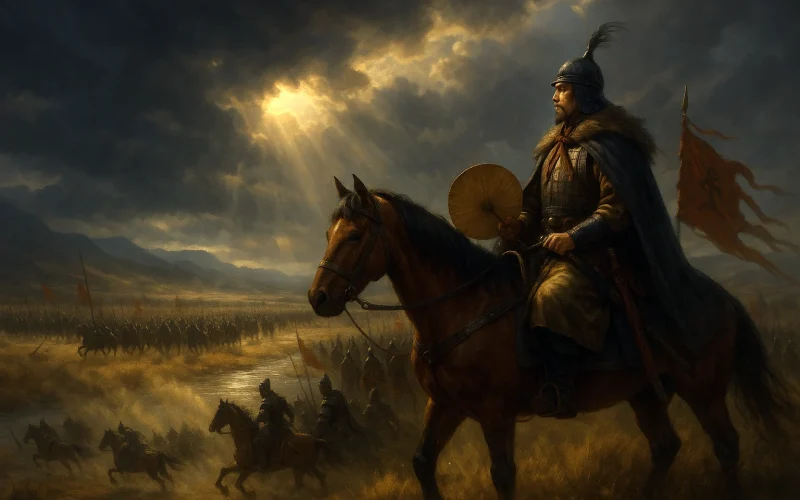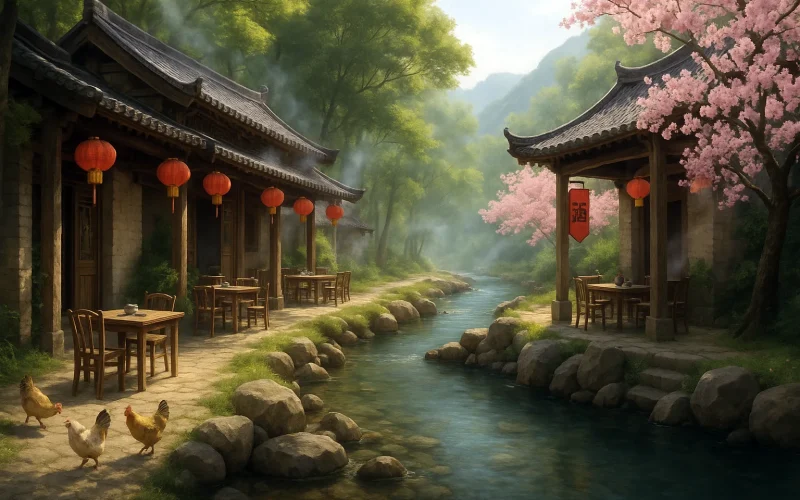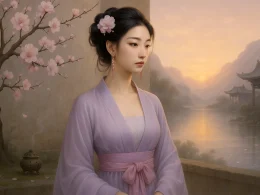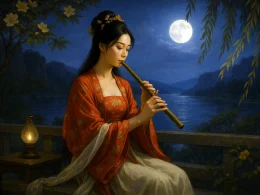Banished immortal's madness—what's the use?
Better return to fields—this truth stands firm.
No jade hall rivals,
Nor three isles' mist—
All vain and pale.
"Li Sao" read through,
Wine's scent still lingers—
World seems so small.
Let them grow cabbages, wheat,
Since Liu Lang left—
Peach blossoms count spring's call.
One night's snow veils orchid boat,
By cold stream seeks Andao.
Now though I write
Ice-pillar poems new—
Who understands their glow?
I see phoenixes soar,
His rafter-brush strong,
Drafts war decrees.
Life's sum: Bai's flair
Won't age on Fragrant Hill.
Original Poem
「水龙吟 · 寄陆放翁」
谪仙狂客何如,看来毕竟归田好。
玉堂无比,三山海上,虚无缥缈。
读罢《离骚》,酒香犹在,觉人间小。
任工菜花葵麦,刘郎去后,桃开处、春多少。一夜雪迷兰棹。傍寒溪、欲寻安道。
刘过
而今纵有,新诗冰柱,有知音否。
想见鸾飞,如椽健笔,檄书亲草。
算平生、白传风流,未可向、香山老。
Interpretation
Composed by Liu Guo during Lu You's retirement in Shanyin, this ci poem embodies the spiritual kinship between two Southern Song patriots. Though separated by three decades, both poets shared unwavering devotion to resisting the Jin invasion. Liu crafts this tribute to honor Lu's reclusive life while subtly urging his return to public service—a testament to their shared ethos of "persisting when all seems hopeless" (知其不可而为之). The work intertwines pastoral admiration with patriotic longing, reflecting the scholar-official's eternal dilemma between retreat and engagement.
First Stanza: "谪仙狂客何如,看来毕竟归田好。玉堂无比,三山海上,虚无缥缈。读罢《离骚》,酒香犹在,觉人间小。任工菜花葵麦,刘郎去后,桃开处、春多少。"
Zhé xiān kuáng kè hé rú, kàn lái bì jìng guī tián hǎo. Yù táng wú bǐ, sān shān hǎi shàng, xū wú piāo miǎo. Dú bà "Lí Sāo", jiǔ xiāng yóu zài, jué rén jiān xiǎo. Rèn gōng cài huā kuí mài, Liú láng qù hòu, táo kāi chù, chūn duō shǎo.
What of those exiled immortals?
After all, returning to fields
proves best.
Jade halls pale before it,
three mystic isles
but misty dreams.
Having read "Li Sao,"
wine's aroma lingers—
the mortal world shrinks.
Let others tend rapeseed and wheat;
since this Liu departed,
how many springs have blossomed
where peach trees bloom?
Liu opens with provocative relativism: even legendary "exiled immortals" (谪仙) like Li Bai rank below Lu's agrarian retreat. "Jade halls" (玉堂) symbolize hollow officialdom, while "mystic isles" (三山) represent escapist fantasies—both rejected for farming's tangible virtues. The "Li Sao" reference reveals Lu's paradox: though physically retired, his Qu Yuan-like patriotism persists ("wine's aroma lingers"). The closing peach blossom allusion subverts Liu Yuxi's political allegory into a meditation on time's silent passage beyond human concerns.
Second Stanza: "一夜雪迷兰棹。傍寒溪、欲寻安道。而今纵有,新诗冰柱,有知音否。想见鸾飞,如椽健笔,檄书亲草。算平生、白传风流,未可向、香山老。"
Yī yè xuě mí lán zhào. Bàng hán xī, yù xún Ān dào. Ér jīn zòng yǒu, xīn shī bīng zhù, yǒu zhī yīn fǒu. Xiǎng jiàn luán fēi, rú chuán jiàn bǐ, xí shū qīn cǎo. Suàn píng shēng, Bái chuán fēng liú, wèi kě xiàng, Xiāng shān lǎo.
One night, snow blinds my orchid boat
by frozen streams—
I seek you, An Dao.
Now even with new verses
clear as icicles,
who understands?
I envision your phoenix-soaring quill,
that pillar-thick brush
drafting war proclamations!
Judge your life: Bai Juyi's grace
must not yet retreat
to Mount Xiang recluse.
Liu invokes Wang Huizhi's snowbound visit to Dai Andao as a metaphor for intellectual pilgrimage. "Icicle verses" (冰柱) crystallizes Lu's poetic purity, while "who understands?" (有知音否) laments the scarcity of worthy readers in their era. The stanza pivots urgently: "phoenix-soaring quill" (鸾飞) and "pillar-thick brush" (如椽健笔) transform writing into military action, culminating in the command to reject Bai Juyi's retirement model ("Mount Xiang recluse"). The final line rings like a general's order—a call to arms disguised as literary advice.
Holistic Appreciation
Liu constructs a poetic diptych that mirrors Lu You's divided self. The first stanza's agrarian ideal ("returning to fields proves best") celebrates Lu's tangible retreat, yet the "Li Sao" reference betrays his irrepressible political conscience. The second stanza shatters this tranquility—snow becomes spiritual blindness, verses turn to weapons, and retirement morphs into surrender.
The work's brilliance lies in its layered persuasion: Liu first validates Lu's choice ("jade halls pale before it"), then isolates his loneliness ("who understands?"), finally appealing to his military-literary identity ("drafting war proclamations"). By invoking Bai Juyi's graceful retirement only to reject it ("must not yet retreat"), Liu masterfully turns admiration into summons.
Artistic Merits
- Agricultural Transcendence
Farming becomes spiritual practice—"rapeseed and wheat" (菜花葵麦) outrank celestial "mystic isles" (三山). - Thermal Poetics
"Icicle verses" (冰柱) and "frozen streams" (寒溪) create chilling isolation versus "wine's aroma" (酒香) warmth of enduring passion. - Calligraphic Militarism
"Phoenix-soaring quill" (鸾飞) and "pillar-thick brush" (如椽健笔) weaponize literary talent into wartime service. - Hagiographic Subversion
Bai Juyi's revered retirement ("Mount Xiang recluse") becomes cautionary tale rather than model.
Insights
Liu's poem reveals how true homage sometimes demands disruption. By urging Lu You to abandon pastoral peace, Liu honors his friend's deepest self—the patriot who, like Qu Yuan, could never fully embrace reclusion despite wine-scented verses.
For modern readers, the work models intellectual courage: Liu risks their friendship by refusing to romanticize Lu's retirement, proving that real respect means calling greatness back to its duty. The "icicle verses" metaphor resonates powerfully today—in an age of curated digital personas, authentic expression still risks finding "no one who understands."
Ultimately, the poem suggests that legacy is forged at the intersection of talent and timing. Lu's "pillar-thick brush" must meet history's urgency, lest he become merely another "Mount Xiang recluse." Liu's tribute thus becomes timeless challenge: will we hide our brightest blades, or unsheathe them when the world most needs their edge?
About the Poet
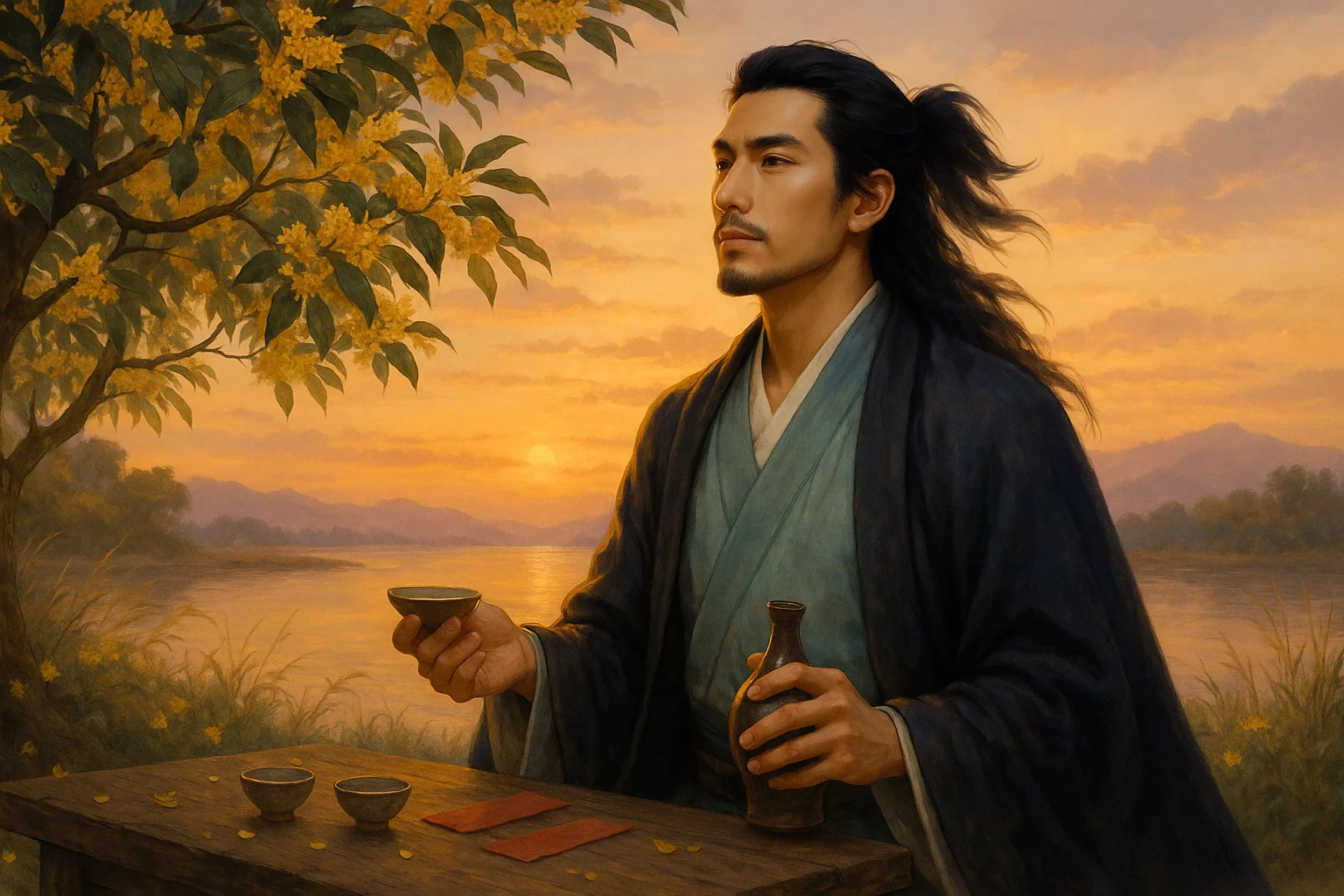
Liu Guo (刘过 1154 - 1206), a native of Taihe in Jiangxi, was a ci poet of the Bold and Unconstrained School (haofang pai) during the Southern Song Dynasty. Though he remained a commoner all his life, wandering the rivers and lakes, he associated with literary giants like Lu You and Xin Qiji. His ci poetry is impassioned and heroic, and his verse is vigorous and forceful. Stylistically close to Xin Qiji but even more unrestrained, Liu Guo became a central figure among Xin’s poetic followers.







